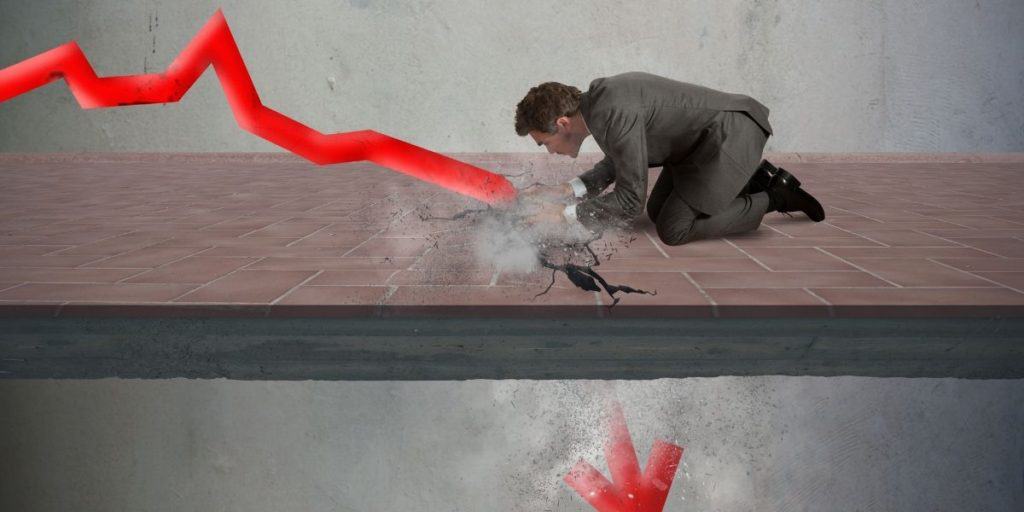Forex is a highly volatile market that presents valuable opportunities for making profits. However, it has risks that may even lead to a trader’s complete loss. Many forex beginners wonder if their forex account can ever go negative.
Your forex account can go negative at times, although it’s rare. A negative balance refers to a situation where you lose more money than your deposit. Stop-loss orders and margin limits don’t allow your account balance to go negative. However, they don’t work at times due to high volatility.
Throughout the article, we’ll elaborate on the situations where your forex account balance goes below zero. We’ll also talk about the strategies to minimize this risk.
IMPORTANT SIDENOTE: I surveyed 1500+ traders to understand how social trading impacted their trading outcomes. The results shocked my belief system! Read my latest article: ‘Exploring Social Trading: Community, Profit, and Collaboration’ for my in-depth findings through the data collected from this survey!
Table of Contents
What Is Negative Balance?
A negative balance means you end up having below-zero capital in your account, but how does it happen?
Forex is a highly volatile market that offers you great opportunities to make a profit. But the same volatility can lead to equal losses if the market moves in your opposite direction. Rapid market changes or significant price gaps could lead to a negative account.

Usually, stop-loss orders act as a safeguard against these losses. But some traders simply don’t want to or forget to place stop-loss orders. It puts them at significant risk of losing their account.
Another reason that stops brokers from executing stop-loss orders is slippage. It refers to the difference between a currency’s expected price and its actual completed price. You place an order, expecting it to execute at a specific price, but it goes over that price, and you’ll end up losing money.
Leverage and other trading instruments such as swaps, options, and forwards can lead to even more losses. For example, when using leverage, you trade beyond your balance, and if you lose, your account could go negative.
Suppose you have $2000 in your account. You use a 4:1 leverage and place an order worth $8000. If there’s a 10% drop in the currency value, you’ll see a 40 percent drop due to the leverage, equal to 3200. So, other than losing your original $2000, you’ll lose an additional $1200, which you owe your broker, who lent you the money in the first place.
Besides, the price will hit the stop loss limit too quickly during high volatility periods, and your broker may not be able to execute it:
How Brokers Can Lead to Your Negative Account?
Most brokers make traders set stop-loss orders or margin calls to prevent their accounts from going negative. A margin call is an order by your broker to increase your money and make up for the lost funds below zero, while a stop-loss order closes a position when the currency pair reaches a certain point.
This way, when the market goes in your opposite direction and you start to lose money, your position won’t go below the point you’ve set. That’s why stop-loss orders are among the most important risk-management strategies every trader has to execute.
However, in some cases, the broker fails to stop the position at that particular point. For example, when the Swiss National Bank suddenly decided to remove the Swiss franc/Euro peg in 2015, the market was caught by surprise, creating severe market volatility. Hundreds of traders lost millions of dollars, and some brokers went bankrupt.
As a result of this announcement, the euro dropped by more than 40% against the Swiss franc, causing trading platforms to freeze. Consequently, margin calls and stop-loss orders could not execute, depleting traders’ accounts even further.
Some brokers accepted to cover a portion of these negative accounts, while other traders had to replenish their accounts at their own expenses. And many others had to leave their accounts because they couldn’t recover them.
This tragic incident, known as the Black Thursday, triggered brokers to think of more precautionary actions to avoid a future negative balance.
Negative Balance Protection
Most brokers try to protect their clients against a negative account with negative balance protection. It’s a complementary safeguard that helps you not to lose more than your deposit. In other words, you won’t owe the broker anything in case of a negative balance.
The broker uses margin calls or stop-loss orders to prevent a negative balance. And if your account goes under zero, they have to pardon it. They simply change the balance to zero and don’t ask you to pay for the loss.
All the trader has to do is to deposit enough capital to make their account reach zero. Then, they can trade with that amount of money without deducting it from their whole account. Plus, your loss can’t exceed your original deposit according to negative loss protection even if you lose more than that.
Do All Brokers Offer Negative Balance Protection?
Not all brokers offer negative balance protection. But even if your broker doesn’t offer this kind of protection, they may have to give up on the negative balance.
When you and your broker don’t live in the same country (which is possible because the brokers’ market is global), they can’t give back their credit. That’s because they don’t have the legal authority to collect money from other countries. So, to stop you from changing your brokerage, they accept the negative balance.
Still, brokers have the right to take legal actions against the trader because when your balance becomes negative, you owe the broker. So, they can have their lawyers contact you to collect their debts.
The reaction to negative balance is mostly the broker’s call. So, they may react differently to this issue depending on their account size, experience levels, and the amount of loss.
When the loss is small, brokers don’t see it worth taking legal action and leave the case. But if they sue the client, they have to obey the law and pay all the money. It can double the pressure on a trader. After all, they have lost 100% of their capital, not to mention their reputation damage due to the sue. Most beginners get discouraged and abandon their accounts in these cases, never returning to the forex market again.
Pros and Cons of Negative Balance Protection
An obvious advantage of this protection is that your balance can never go negative, and you can’t lose more than your capital. So, you can redeposit your account and trade again. That’s particularly useful if you’re a new trader and aren’t familiar with how the market works,
especially after major news announcements. It also allows you to use leverage more confidently because your broker is accountable for your loss.
Negative balance protection is also a good sign that shows your broker is legitimate because it helps you legally protect your account. But be careful because it may choose to increase the fees to make up for its potential losses.
What’s more, some brokers don’t offer true protection against negative balance. They only exploit it as a false advertisement to lure newcomers. That’s why you have to research carefully before choosing a broker.

Author’s Recommendations: Top Trading and Investment Resources To Consider
Before concluding this article, I wanted to share few trading and investment resources that I have vetted, with the help of 50+ consistently profitable traders, for you. I am confident that you will greatly benefit in your trading journey by considering one or more of these resources.
- Roadmap to Becoming a Consistently Profitable Trader: I surveyed 5000+ traders (and interviewed 50+ profitable traders) to create the best possible step by step trading guide for you. Read my article: ‘7 Proven Steps To Profitable Trading’ to learn about my findings from surveying 5000+ traders, and to learn how these learnings can be leveraged to your advantage.
- Best Broker For Trading Success: I reviewed 15+ brokers and discussed my findings with 50+ consistently profitable traders. Post all that assessment, the best all round broker that our collective minds picked was M1 Finance. If you are looking to open a brokerage account, choose M1 Finance. You just cannot go wrong with it! Click Here To Sign Up for M1 Finance Today!
- Best Trading Courses You Can Take For Free (or at extremely low cost): I reviewed 30+ trading courses to recommend you the best resource, and found Trading Strategies in Emerging Markets Specialization on Coursera to beat every other course on the market. Plus, if you complete this course within 7 days, it will cost you nothing and will be absolutely free! Click Here To Sign Up Today! (If you don’t find this course valuable, you can cancel anytime within the 7 days trial period and pay nothing.)
- Best Passive Investment Platform For Exponential (Potentially) Returns: By enabling passive investments into a Bitcoin ETF, Acorns gives you the best opportunity to make exponential returns on your passive investments. Plus, Acorns is currently offering a $15 bonus for simply singing up to their platform – so that is one opportunity you don’t want to miss! (assuming you are interested in this platform). Click Here To Get $15 Bonus By Signing Up For Acorns Today! (It will take you less than 5 mins to sign up, and it is totally worth it.)
Conclusion
A negative balance can occur when you lose more than your capital. Stop-loss orders and margin calls prevent your account from going below a particular amount. However, sometimes they don’t work, and you’ll end up losing your money. In such cases, you’ll be liable and have to pay the difference to the broker.
Negative balance protection is a plan executed by brokers to make sure your account doesn’t go negative. The broker promises to keep your account at zero in cases of loss.
BEFORE YOU GO: Don’t forget to check out my latest article – ‘Exploring Social Trading: Community, Profit, and Collaboration’. I surveyed 1500+ traders to identify the impact social trading can have on your trading performance, and shared all my findings in this article. No matter where you are in your trading journey today, I am confident that you will find this article helpful!
Affiliate Disclosure: We participate in several affiliate programs and may be compensated if you make a purchase using our referral link, at no additional cost to you. You can, however, trust the integrity of our recommendation. Affiliate programs exist even for products that we are not recommending. We only choose to recommend you the products that we actually believe in.
Recent Posts
Exploring Social Trading: Community, Profit, and Collaboration
Have you ever wondered about the potential of social trading? Well, that curiosity led me on a fascinating journey of surveying over 1500 traders. The aim? To understand if being part of a trading...
Ah, wine investment! A tantalizing topic that piques the curiosity of many. A complex, yet alluring world where passions and profits intertwine. But, is it a good idea? In this article, we'll uncork...
